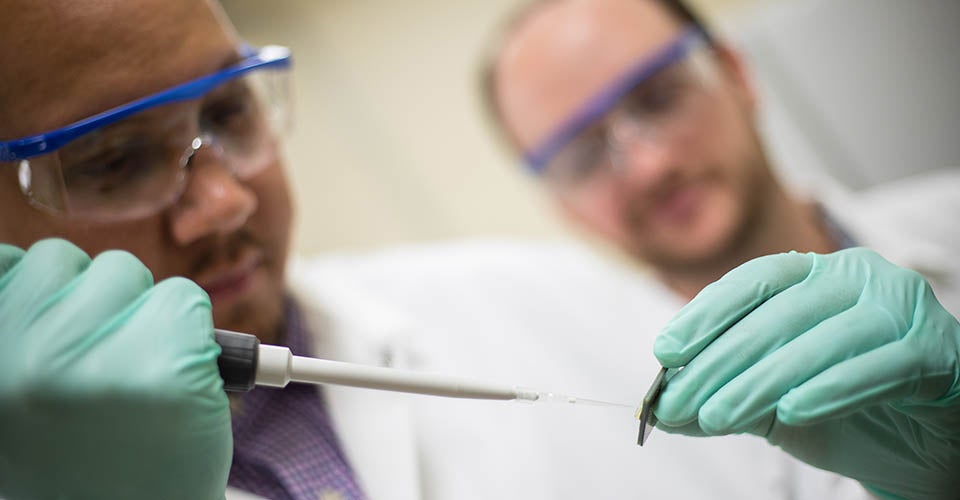STROKE STUDY
Project aims to identify genetic markers for stroke risk
Strokes are the fourth-leading cause of death in the United States and the top cause of serious long-term disability, and two East Carolina University biology professors are working to identify genetic markers that indicate greater risk of recurrent stroke.
Work by Dr. Keith Keene and Dr. Michael Brewer could provide insight into personalized risk assessment, targeted prevention and response to treatment, helping to reduce the health impact of strokes. The National Institutes of Health (NIH) has awarded a grant of almost $450,000 to fund the project, which will also expose students to the research process.
The grant will cover research expenses such as DNA sequencing, stipends for students, researcher salaries and travel to national genetics meetings and conferences.

The project focuses on two regions of the human genome thought to be associated with stroke risk.
Using DNA from a clinical trial conducted in the 1990s, Keene and Brewer will examine two regions of the human genome that have been identified in previous research as potentially having markers that could indicate a higher risk of recurrent stroke. The sample represents a mix of ethnicities, which Keene said is important because different ethnicities have different likelihoods for suffering a stroke.
“Instead of sequencing the entire genomes of these people, we’re going to capture these two regions of the genome through DNA hybridization — we’re going to make probes that grab these two sequences of the genome — so that we can sequence a lot of individuals for those smaller regions,” Brewer said. “It’s more cost-effective than sequencing the full genome.”
The ultimate goal is to better understand the factors that contribute to stroke risk in order to tailor prevention and treatment efforts to each individual, a concept known as precision medicine.
The study could potentially help explain why African Americans have nearly twice the likelihood of having a stroke, are more likely to have a stroke at a younger age and are more likely to die from a stroke.
“Our goal is to get to … where you can essentially tailor someone’s treatment, their clinical outlook and how they’re cared for by incorporating genetic information, diet, exercise, the big picture of that person’s overall environment and what is contributing to their health, to really tackle diseases,” Keene said.
As with all NIH R15 grants, exposing students to research is an important component of the project.
“We hope that we can teach the students the entire process of DNA sequencing and the analysis associated with it,” Keene said. “Not only do they get hands-on laboratory experience, but they also get bioinformatics and computational experience.”
There will be five to 10 undergraduates and at least one graduate student participating in the research.
“Given what a lot of our students want to do — go to med school or work in the biotech industry — the skills that they’re learning, either through experimental design and the interpretation process or the basic lab skills and DNA technology skills, are setting them up for a real advantage when they get out of here,” Brewer said.
Brewer, who got his Ph.D. at ECU, and Keene, who grew up about an hour away from Greenville, have complementary skillsets that will contribute to the study. Keene has a background in studying health disparities and is familiar with the intricacies of conducting grant-funded research, while Brewer is an expert in bioinformatics and computational analysis.
Together, they and their team will conduct research over the next three years that could have important implications in the biotechnology and biomedical fields.

Undergraduate and master’s students will have an opportunity to be involved in the research from start to finish.